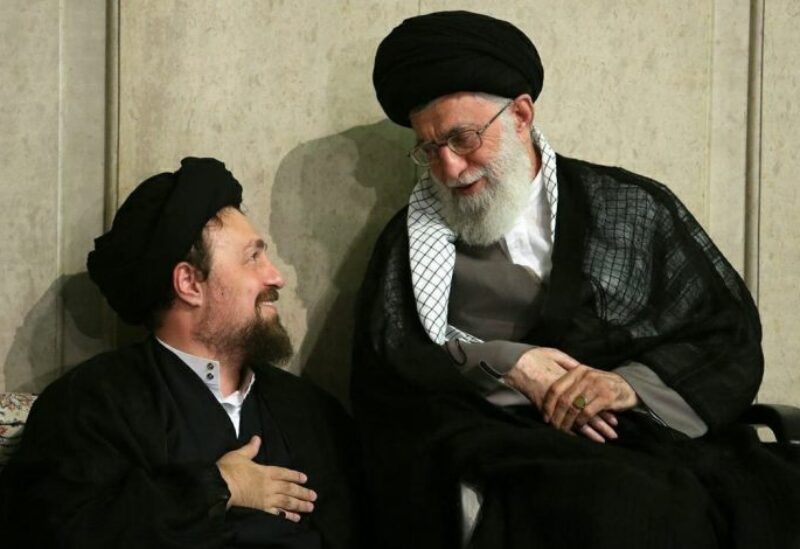How is Khamenei Interfering in the Iranian Presidential Elections?
.jpg)
The British BBC shed light on the role of Iran’s Supreme Leader, Ali Khamenei, in the presidential elections scheduled for June 2021.
Writer Massoud Azar asked in an article published in the Persian version of the network: Should Khamenei accept candidates running in the elections or not, since he must know who wants to run?
Azar also touched on the discussion of Hassan Khomeini, the grandson of the Leader of the Islamic Revolution, meeting with the Supreme Leader, and his desire to run for the presidency.
He said: “Hassan Khomeini’s retreat from announcing his candidacy in the presidential elections met with various reactions in the Iranian media and social networks.”
The Kayhan newspaper considered this news as a rescue for Hassan Khomeini from the “election trap” on the side of the enemies of the Imam’s Line.
Media forums close to the reformists wrote about changing the equation of the elections and the difficult days for this group, and ArmanMeli news agency talked about the reformists’ turning to former President Mohammad Khatami again.

Consult or Permission?
Consulting or getting permission from the leader to run for elections is a matter of habit, the writer says, whereby the candidates decide whether or not to run according to the response of the leader.
Khamenei sometimes prevents some people from running, as happened with Mohammad Baqer Qalibaf in the 2009 elections and Mahmoud Ahmadinejad in 2017. He encourages or compels some, or remains silent and does not answer in some cases, as happened in the 2013 elections.
Akbar Hashemi Rafsanjani considered the leader’s silence based on approval and registered his name, but this silence seemed greater than disapproval as his powers were denied by the Guardian Council.
The Kayhan newspaper wrote that the issue of banning candidates was a measure related to the past, and never has it been related to enjoining and forbidding.
A media outlet close to Khamenei did not consider him interfering in the elections, and rather said that he gives consults, and emphasized that obeying the Supreme Leader is tantamount to obeying the Imam.
The fundamentalist Resalat newspaper wrote, describing the Leader’s opinion as parental advice, and considered critics of his intervention stupid or traitors.
The writer wonders: “Taking into account the writings of the two newspapers since they are close to the government, what do Khamenei’s advices mean for the candidate facing the public, according to the Resalat newspaper?”
Is there a possibility to confront the Leader’s opinion, as Mahmoud Ahmadinejad announced his candidacy in 2017, or is there no trick other than acknowledging the status quo?
Ali Khamenei said regarding elections, that he does not have more than one vote in every election and will not obligate anyone to give his vote to a specific person, and no one will know about the Leadership vote, and that the elections are not affiliated with the Leadership.
He wants from showing and repeating this rhetoric for the people to take the final decision. Regarding the elections, he says that the people are aware of the enemies’ conspiracies, as he plays the role of an active observer in the elections, according to the writer.
Khomeini’s Role
Azar continued: “In different periods, such as the sixth council elections and the presidential elections, the scale of participation in the elections played an important role in changing its results.”
The role of the Guardian Council and the Leader increased after the Iranian Revolution, as the fundamentalist writer and researcher Mahdi Nasiri considered that Hassan Khomeini’s change of heart—to refrain from the decision to run for presidency—on Twitter as another sign of the Supreme Leader’s role in all aspects of the country.
Hassan Khomeini met Ayatollah Khamenei and they talked about the maximum participation of the people in the elections. He wanted to open the way for the presence of different candidates, and he criticized the fact that an intellectual current was deprived of the elections.
His speech during the meeting with members of the Democratic Party was electoral indications, and it seems that he was close to the final decision to run in the elections.
It is worth noting that Hassan Khomeini does not have any experience in the executive, judicial and legislative branches, and his performance cannot be criticized, and reformists cling to him. Because it is not possible to cross the Guardian Council threshold in the absence of a strong candidate, and they wanted him to join the elections.
Taking his place in the Khomeini family into consideration, they hoped that he would be the appropriate choice in the face of the fundamentalist party’s candidates, according to the writer.
It seems that the fundamentalist media forums and newspapers supported him in withdrawing from the candidacy and complimenting and glorifying him as Khomeini’s grandson.
The Islamic Republic of Iran is at the doors of the beginning of the elections during the next two months, and until now the candidates are unknown, and the economic situation of the country for the past four years has been further corrupted, as the demonstrations of workers and the pensioners continue.
The elections also come in light of the outbreak of COVID-19 and neglect in affording the vaccine, as the political mistrust of the people in the government has multiplied, according to Massoud Azar.






